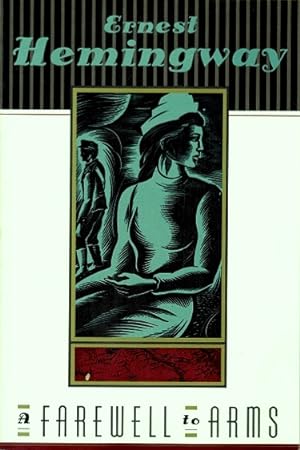I was always embarrassed by the words sacred, glorious, and sacrifice and the expression in vain. We had heard them, sometimes standing in the rain almost out of earshot, so that only the shouted words came through, and had read them, on proclamations that were slapped up by billposters over other proclamations, now for a long time, and I had seen nothing sacred, and the things that were glorious and had no glory and the sacrifices were like the stockyards at Chicago if nothing was done with the meat except to bury it. There were many words that you could not stand to hear and finally only the names of places had dignity. Certain numbers were the same way and certain dates and these with the names of the places were all you could say and have them mean anything. Abstract words such as glory, honor, courage, or hallow were obscene beside the concrete names of villages, the numbers of roads, the names of rivers, the numbers of regiments and the dates.
Frederic Henry is, as Hemingway himself was, an ambulance driver in World War I. Henry is an American serving in the Italian army, seemingly for no other reason than he was bumming around in Italy at the time that the war began. In the novel's beginning, he falls in love with a British nurse named Catherine Barkley; when he's injured by a shell, Catherine is able to tend to him during his convalescence. Convalescence is itself a kind of idyll, a reprieve from the drudgery of war--even with the injury, Henry has not seen much that could be called horror--and Catherine ends up pregnant. When Henry recuperates and it cast back to the front to endure the bloody chaos of a long retreat, one in which the ashamed and defeated Italians have begun to shoot their own officers. It is a long and horrible road back to Catherine, and even once reconciled, they must hatch a plan to escape Italy.
Hemingway's writing seems so simplistic, and its character has become such a truism, that it's easy to forget how remarkable it is. No one has ever invented a better style than Hemingway's plain language for writing about war, an experience whose sheer awfulness cannot be emphasized, only concealed, by stylistic tricks. The wearying, interminable nature of Henry's journey from the alto piano back to Milan through the driving rain is reflected in that language, which at times seems like the writing of a man for whom all pretense has at last been stripped away. It belongs to the "proclamations" on billboards. And Henry/Hemingway cut through such pretense with horrible lucidity:
If people bring so much courage to this world the world has to kill them to break them, so of course it kills them. The world breaks every one and afterward many are strong at the broken places. But those that will not break it kills. It kills the very good and the very gentle and the very brave impartially. If you are none of these you can be sure it will kill you too but there will be no special hurry.
I'm no Hemingway expert, but I've often thought that his lit-Twitter critics often fail to understand him. He led a macho sort of life but his best works are often trenchant critiques of machismo, and A Farewell to Arms is one of the best critiques of the machismo that leads to war I've ever read. Its message is actually, at its heart, sort of simple: war is extremely stupid. Henry is absolutely unable to articulate to anyone why he participates in it, much less why he joined the army of a foreign country. Over and over again he is mistaken by Italians, who know no better, for something other than American: even a doctor at the hospital refuses to talk to him because he thinks he is an Austrian. By the end, it doesn't even matter; the alliances have broken down and the Italians, having failed to shoot the Austrians, simply settle for shooting other Italians.
I also thought Catherine was a marvelous character for an author who has a reputation for not writing well about women. I can see how others might disagree: she copes with war service by living inside of fantasies, and her relationship with Henry, while not a fantasy itself, becomes a vessel for these. When these fantasies break down we find behind them terrible presentiments of wreck: "I'm afraid of the rain," she tells Henry, "because sometimes I see me dead in it... And sometimes I see you dead in it." What's more, there's no doubt that what Henry and Catherine have is really love, the head-over-heels Hollywood kind.
I wasn't prepared for the ending of this book. I won't spoil it, even though I don't think you really ought to care too much about spoiling books that are a century old, because it hit me very hard. The world has seemed, to varying degrees, to be so heavy with death over the past year, and this past week has felt like this even moreso. I'm not sure I've ever read an ending that is so pitiless or without redemption. But that, too, is Hemingway's clear eye: war and death are pitiless and without redemption. There is no point to them, and when they come, there really isn't anything left to say.


No comments:
Post a Comment